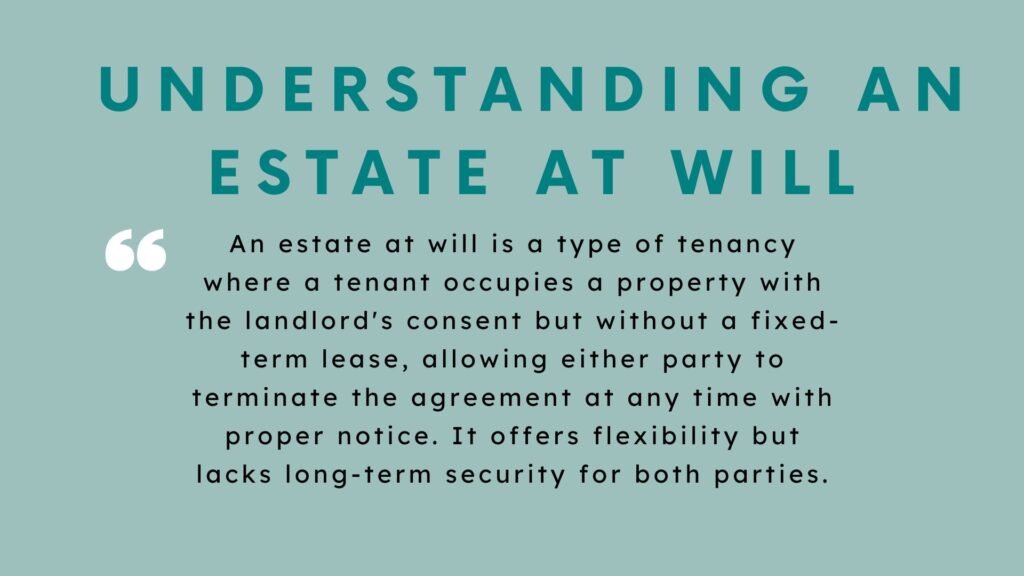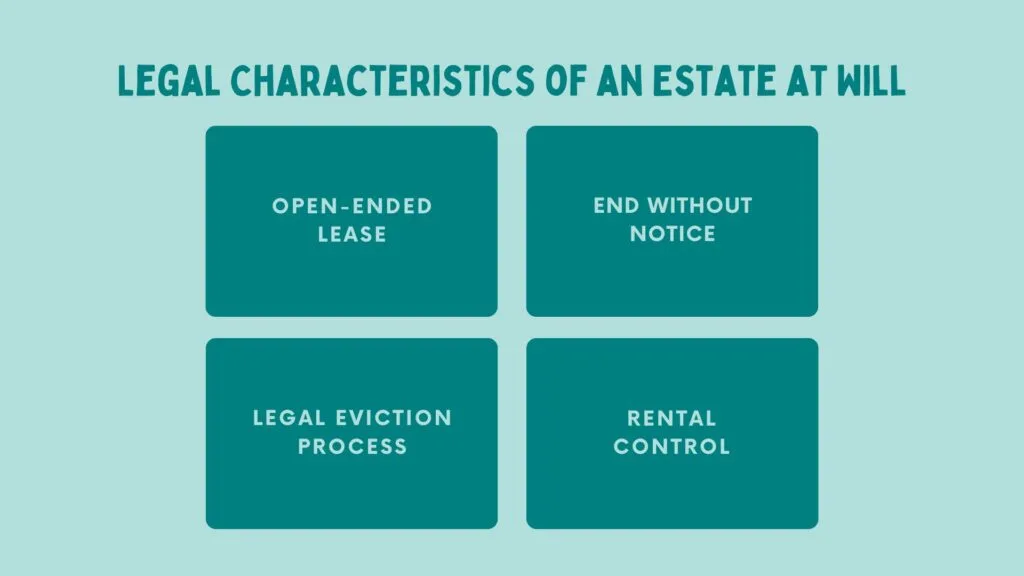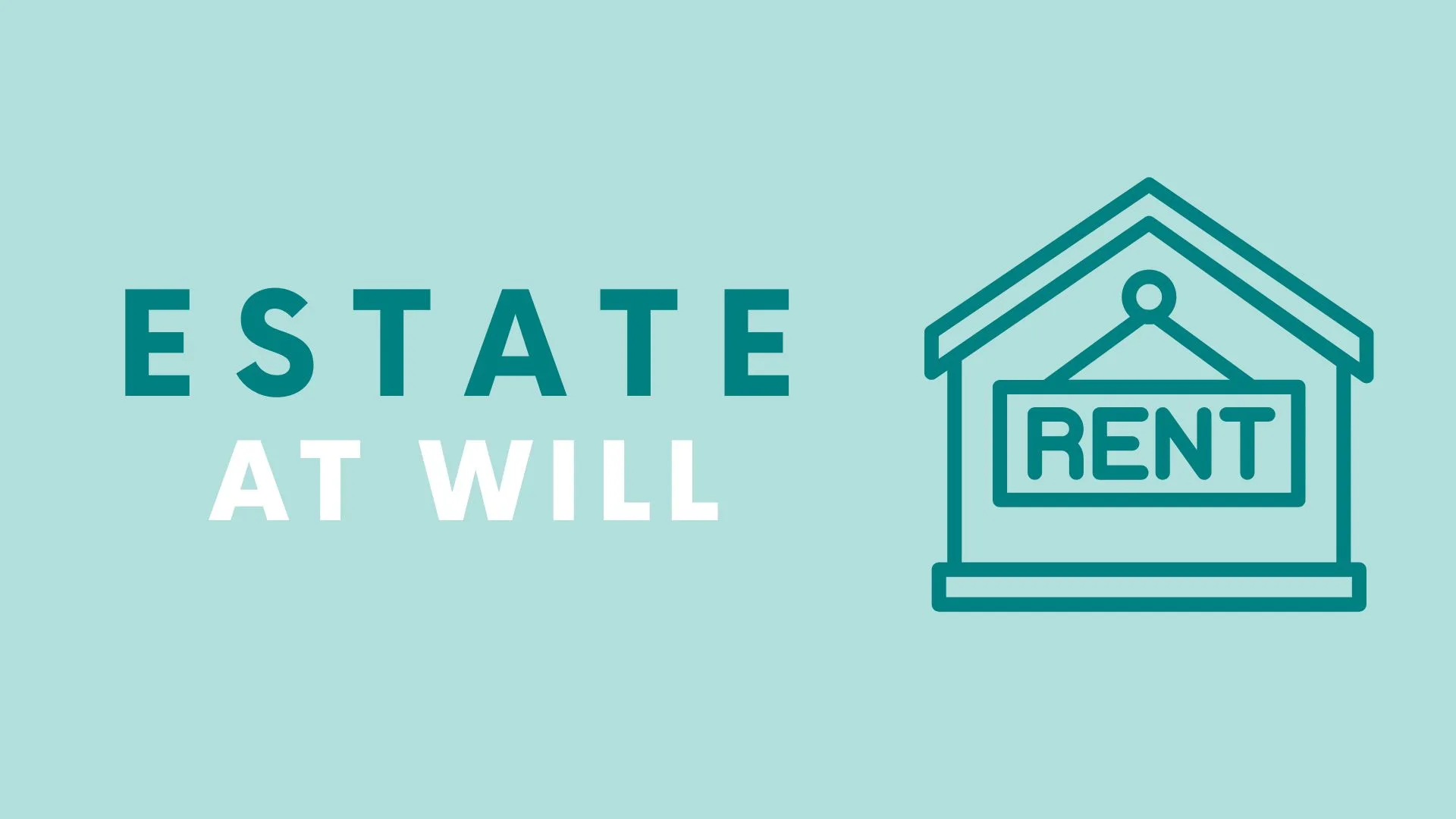When you want to rent a property, the standard procedure is to sign a fixed-term lease where you (the tenant) agree on the rent and duration of their stay. If you intend to stay longer, you must sign a new agreement with the current pricing. This is the standard procedure.
However, if you want a more flexible type of arrangement, that’s where Estate at Will comes in. In this post, we will explore everything you should know about the estate at will. From its characteristics to the benefits and risks to everything you should be aware of when deciding which type of lease is better for you.
Understanding an Estate at Will

An estate at will is a renting option where the tenant rents the property with the landlord’s permission, but there is no official paperwork involved that shows that the tenant occupies the property at rent. This is an easier, non-standard renting option which can continue till the tenant leaves the place or the landlord decides to end it. There is no fixed duration or agreement with specified terms about how the rental price will be decided.
Estate at will entirely operate on the trust and understanding between both parties. As the process is informal, it lacks legal aspects, which makes it very flexible in terms of renting terms, but it also comes with the risk of the rental agreement being ended abruptly by either one without any notice.
READ MORE 5 Key Differences Between Condotels and Airbnb Rentals: Which is Better Investment?
An Estate at Will Example
Let’s take an example to better understand.
Suppose Cameron started an estate at will rental lease with Mr Jay and started living at his house. No formal procedure or legal document is binding on either party; they had a verbal agreement in which they decided on the rent and other significant aspects, and Cameron started living. This agreement will continue until one of the parties is unsatisfied and wants to end it.
So what happens with this agreement is that Cameron got a place on rent quickly without having a rental lease in his name and no documents, just based on verbal trust. On the other hand, Mr Jay got a tenant who pays the said rent without any legal formalities, eliminating a long process, and he can evict Cam if he finds someone who pays more or if he wishes to sell the property.
Legal Characteristics of an Estate at Will

- No Fixed Term: It is an open-ended lease that can be terminated at any time without any prior notice period by either party. No formal procedure or legal document is binding the owner or the tenant, so either party can end the lease for any reason.
- Termination Rights: Either party involved in the lease can terminate the lease at will without any prior notice or reason. However, some localities have local laws on leasing that may require them to give a notice period before terminating the lease.
- Tenant Rights: Estate at will may be an informal lease agreement, but tenants still have their tenant rights. For example, the landlord cannot evict the tenant forcibly without prior notice, and they must follow the laws regarding eviction in their jurisdiction.
- Landlord Rights: Even though the agreement is non-legal and informal, landlords also retain their legal rights regarding rental prices and evacuation rights.
Termination of an Estate at Will
As the lease is flexible and can be terminated anytime, here are some situations where the lease is terminated.
- Notice: If either of the parties gives notice to terminate the agreement. The typical notice period for these leases is around 30 days, but it varies based on local laws.
- Death of the Landlord or Tenant: The lease is automatically considered terminated in such cases.
- Sale of the Property: If the owner decides to sell the place, the leases can be terminated. If the new owner of the property decides to continue with the same agreement, then the lease will be verbally renewed with the new owner.
As the lease agreement is verbal, it is easy to terminate the lease without too much hassle of legal formalities.
READ MORE 7 Reasons You Should Rent a Home in Retirement
Estate at Will vs Periodic Estate
Notice Requirement: A periodic estate lease is more formal and legal and requires a formal notice period for termination. The notice period can range from 30-60 days, depending on the terms. On the other hand, an estate-at-will lease can be terminated with minimal notice.
Legal Protection: A periodic estate agreement protects both parties more. As a formal agreement with a written lease, both parties must follow proper procedures before taking action. Meanwhile, for an estate at will, there is no formal agreement; it’s a verbal contract, which means both parties can make any decision quickly and with minimal notice.
Flexibility: Regarding flexibility, the periodic estate is more rigid and governed by predetermined laws. Any party wishing to vacate the place must follow proper procedure. And here’s where an estate at will shines: both parties under this agreement can move out or evict with minimal notice.
Benefits of an Estate at Will

Flexibility
With this agreement, the owner and the tenant have more flexibility when setting the terms. The tenant can stay as long as they want as both parties agree on the rent, and the owner can ask the tenant to evacuate the place whenever they want.
No Long-Term Commitment
An estate at will is an excellent option for people looking for a short-term lease for a few days or months. With the no commitment clause, people who need to relocate can quickly move in and out as they find a better place or if their job is done.
Lower Costs
The agreement requires no paperwork, which means there isn’t a legal commitment that the rent should be fixed; this allows the owner and tenant to come to a rental price that suits both their requirements. If the tenant doesn’t have enough to pay for the starting period, they can talk to the owner to lower the rent. Moreover, with no legal documentation, the process eliminates the need for administrative costs.
Mutual Convenience
These leases can be terminated anytime, making it much easier for both parties if they have better plans. Suppose the tenant found a better place or has to relocate immediately. In that case, they can move without the hassle of a long notice period. In the same way, the owner can ask the tenant to leave if they want to rent it to someone else or want to sell the place.
Risks of an Estate at Will
Uncertainty
With freedom also comes uncertainty. The owner cannot be sure how long the tenant plans to stay, meaning they cannot rely on the same place to generate revenue for a long time. In the same way, the tenant is not sure when the owner might leave; it can be a stressful job to be constantly on the lookout for a new place.
Lack of Security
With no formal and legal documents, it might be flexible. Still, it also means that there is no security from either side. The landlord may ask the tenants to leave on very short notice, leaving the tenants to find a new place quickly.
In the same way, the tenant can also leave without notice; they can even pack their bags and leave without saying. Moreover, without formal documents, the owner has no idea what kind of people they lease the house to.
Limited Legal Protection
Proper documentation that protects the tenant and the owner from unexpected termination, improper rental process, and late payments is not available for a lease under an estate and will contract. A few laws may apply based on the local laws on renting.
READ MORE Top 12 Benefits of Renting Instead of Buying
Frequently Asked Questions (FAQs)
What is meant by tenant at-will?
A tenant at-will is a rental agreement between the landlord and the tenant where the tenant stays with the landlord’s permission but without any formal lease so that either party can terminate the arrangement at any time, typically with short notice.
What is the meaning of loss of estate?
Loss of estate refers to someone losing their property rights due to a breach of contract, death, or legal action.
What happens if there is no rental agreement?
If there is no rental agreement, the lease will be called “Estate at will”, where the owner or the tenant can end the agreement with minimal notice.
Final Statement: Is an Estate at Will a Good Idea?
If you are someone who needs to temporarily relocate because of a job or some other job and are not sure how long you have to stay, this arrangement can be better than a formal and legally documented lease. If you are a homeowner planning to sell or renovate your house after a few months and still wish to generate some income before the work starts, this can be a suitable arrangement.
Before you make any decisions on this type of arrangement, consider how important stability and flexibility are for you. This arrangement may not be the best option if you lean more toward stability. But if you need a more flexible arrangement, this might work.


2 thoughts on “What is Estate at Will?”